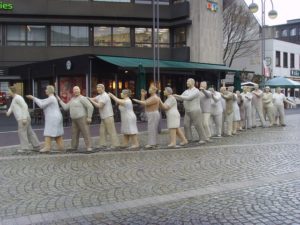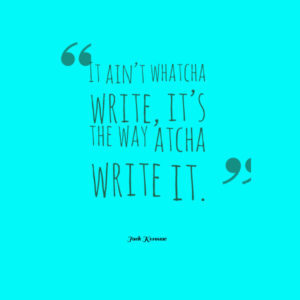Kris Spisak's Blog, page 35
July 26, 2016
Writing Tip 181: “Bemused” vs. “Amused”

And speaking of the writing muse, I’ve been pretty psyched about some progress with my fiction lately. Stay tuned for details!
Some speak of the Muse, when discussing their writing. Today, I’m going to ask which one.
No, we’re not talking about Calliope, but we are discussing two words that have the same derivation in the French word muser, which back in the 15th century meant to stare blankly. Here’s the tip you should know just in case Calliope hasn’t whispered it in your ear:
Bemused (adj) means to be confused or puzzled.
Amused (adj) means to be entertained.
Sure, “bemused” is used to a lesser degree, but that doesn’t mean that it’s a fancy way of saying “amused.” It’s not cute, eloquent, or quaint. It’s just wrong.
The Writing Muse, if you believe in such things, would surely not approve.
The post Writing Tip 181: “Bemused” vs. “Amused” appeared first on Kris Spisak.
July 19, 2016
Writing Tip 180: Dialogue Tags – 3 Tips
We talk to people all the time. We listen and interact, because that’s what people do. Then why is it that writing dialogue can be so tricky?

And then, he said, “I’ll show you whose head is in the clouds.”
I’ve discussed the power of using dialogue to differentiate characters and , but today, let’s just focus on dialogue tags, the “he said,” “she said,” or similar phrases surrounding a character’s spoken words.
3 Tips for Stronger Dialogue Tags
Dialogue tags are only necessary when the reader is unsure who is speaking. Through dialogue that rings true to specific characters and your other narration, it’s often stronger and tighter to skip unnecessary tags.
Keeping simple is often the best way to go. Using “said,” “asked,” and comparable words isn’t necessarily dull. Dialogue tags are there to serve a purpose. When you get too colorful with your tags—“bellowing,” “wailing,” or “thundering,” for example—it distracts from the story. (Meanwhile, adverbs surrounding dialogue tags are another conversation entirely).
Allow the dialogue to remain the focus by inserting dialogue tags (if needed) after a character’s words. Starting with “he said, ‘the sky is falling,’” puts the focus on “he” rather than what’s being said. Reversing it and writing, “‘The sky is falling,’ he said,” keeps the focus on the story. Of course, the format of inserting dialogue tags within a character’s words—such as “‘The sky is falling,’ he said. ‘Watch out.’”—is also a strong option.
Dialogue can run off of our fingers onto the keyboard like we’re transcribing the voices in our heads, and sometimes it feels pulled out of our characters with difficulty; however, in the midst of a story, don’t let the dialogue tags be what holds back the greater narration.
Happy writing, everyone!
Oh, and Writing Tip 180.1 – “Dialogue” is the more commonly accepted spelling of words spoken in a literary form; “dialog” is most commonly used in computing (e.g., dialog boxes).
The post Writing Tip 180: Dialogue Tags – 3 Tips appeared first on Kris Spisak.
July 12, 2016
Writing Tip 179: Pronoun Clarity
 If Eleanor Roosevelt and Wonder Woman walked into a bar (stay with me, folks), and she drank a beer in an iced-tea glass, do you know who “she” is? How’s that for a grammatical riddle with some feminism on the side?
If Eleanor Roosevelt and Wonder Woman walked into a bar (stay with me, folks), and she drank a beer in an iced-tea glass, do you know who “she” is? How’s that for a grammatical riddle with some feminism on the side?
Besides the fact that I really wish I could join this duo and be the mysterious “she” in that sentence, the pronoun remains confusing. There are two women here. Which one is the “she”?
I bring up this fabulously fictional scenario to illustrate a point. Be careful with your pronouns. Yes, we could discuss personal pronouns, demonstrative pronouns, relative, reflexive, indefinite, and even their antecedents, but I’m not going there.
He, him, she, her, it, you, they, them, who, whom, etc.—you know them; you love them; you use pronouns all the time. Just make sure you always use them with clarity. These little words can cause confusion far beyond any scenarios that begin with walking into a bar.
Oh, and speaking of that bar…
The answer to my riddle dives into some history. When Prohibition ended and Eleanor Roosevelt took on the task of reintroducing moderate alcohol consumption at the White House, she insisted on serving beer in iced-tea glasses; however, Roosevelt was also defined by her childhood as the daughter of an alcoholic and never touched it. Thus, the beer at the bar was clearly suggested by Roosevelt and drank by Wonder Woman.
And I still want to join them.
Cheers, everyone!
The post Writing Tip 179: Pronoun Clarity appeared first on Kris Spisak.
July 5, 2016
Writing Tip 178: “Tortuous” vs. “Torturous”

Watch out for that curve! (And that pesky letter R, apparently)
If you’re on a long car ride through the mountains, you could call it tortuous, or if you’re prone to getting car-sick, maybe it’s even torturous; however, it’s essential that you know the difference. Look closely. Did you notice that I used two different words? Yes, these are in fact two different words.
Remember:
“Tortuous” means either full of twists and turns or excessively complicated, lengthy, and complex.
“Torturous” (the word you probably think you’re always using) means involving or causing great pain and/or suffering.
You might feel like grammar lessons are tortuous, or you might think they are torturous. But it’s my goal to avoid either. (How am I doing?)
The post Writing Tip 178: “Tortuous” vs. “Torturous” appeared first on Kris Spisak.
June 28, 2016
Writing Tip 177: “Queue” vs. “Cue”

Will this queue move on cue when the Starbucks opens?
You know what’s cool about the word “queue”? You can remove its last four letters, and it’s still pronounced the same way. Of course, it’s also pronounced the same way as the word “cue.” Are you spelling the word you intend to? (I’m looking at you, American writers.)
Remember:
“Cue” (noun) means either a signal prompting an action (e.g., she entered the stage after her cue) or the long stick used in the game of billiards.
“Cue” (verb) means to act as a prompt or reminder (e.g., my writing tip cued you to write “cue” correctly) or to ready a piece of audio/video for play (e.g., he cued up the movie).
“Queue” (noun) means a line of people waiting. It also has definitions when it comes to computing, but those are a bit too technical to define here.
“Queue” (verb) means to get in line.
“Que” is not an English word.
“Queue” vs. “cue” does get a bit confusing, because both can be used with the preposition “up.” One can cue up something, and one can queue up. Taking your time to remember is important, though.
Brits seem more comfortable with the difference between these words. In the U.S., people often use the “cue” form for everything. But let’s be better than that, Americans. I have faith in you.
The post Writing Tip 177: “Queue” vs. “Cue” appeared first on Kris Spisak.
June 23, 2016
Enter to Win a 50-Page Substantive Edit of your Novel!
 Kris Spisak’s editing clients have gained literary agents and become Amazon best-sellers. Are you ready to elevate your story?
Kris Spisak’s editing clients have gained literary agents and become Amazon best-sellers. Are you ready to elevate your story?
Click here to enter!
Contest runs June 23 – July 1, 2016
What is a Substantive Edit of your Novel?
A Substantive Edit (heavy edit) involves an examination of clarity, logic, structure, and pacing, as well as plot, character, and setting development. More than a basic proofread, a substantive edit focuses on word usage, tone, style, voice, and total writing strength. Notes will be given on a page by page basis, and overall project commentary will also be included.
The Substantive Edit for this giveaway will also include the identification and correction of typographical errors, punctuation errors, and grammar flaws.
Fiction Edit Giveaway Rules:
A 50-page edit includes up to 12,500 words.
Fiction manuscripts only.
Editing will begin no sooner than 7/5/16 and will be returned to the author within two weeks of the start date.
Must be at least 18 years old to enter.
Learn more about Kris’s editing and what her past clients have to say here.
The post Enter to Win a 50-Page Substantive Edit of your Novel! appeared first on Kris Spisak.
June 21, 2016
Writing Tip 176: Please Don’t Write “Please RSVP”

Oh, the poor thing…
At this moment in history, I almost can’t bear to tell you to be less polite—in fact, I beg you to consider your words through a lens of respect and kindness—but one way to be considerate is to get your words right. Please stop writing “Please RSVP”!
Do you know the abbreviation “RSVP” stands for “Répondez s’il vous plaît”? This translates to “respond if you please” or, more simply, “please respond.”
Every time someone writes “Please RSVP,” there is a French fairy somewhere that drops dead. That’s what Peter Pan said after all, isn’t it?( Okay, maybe that’s not quite how it went, but doesn’t it sound silly to write “please please respond”?)
I’m all for etiquette, but the “please please” is a bit over the top.
Save the French grammar fairies, folks. Next time you send an invitation, get this one right.
The post Writing Tip 176: Please Don’t Write “Please RSVP” appeared first on Kris Spisak.
June 14, 2016
Writing Tip 175: “Elicit” vs. “Illicit”

I know how your mind works, Indiana pranksters. I’m onto your tricks.
If you cook a garlic-heavy dinner for your friends in Indiana and insist after a few drinks that they take public transit home, you would be eliciting something illicit. (It’s illegal in Gary, Indiana to use public transportation within four hours of eating onions or garlic.)
If you told your lovey-dovey friend in Idaho to steal her heart all over again by buying her a gigantic box of chocolates, you might be eliciting something illicit. (It’s illegal in Idaho to give a gift of candy if it is more than 50 pounds.)
If (a few years back) you told your friend to parallel park an elephant next to a parking meter in Florida without paying, you’d have been eliciting something illicit. (If one put an elephant in a parking spot with a meter in Florida, elephant parking used to have to be paid.)
I really want to go on here, but I won’t. Long story short, this is a fun pairing of near homonyms.
Remember:
Elicit (verb) means to extract, draw forth, evoke, or prompt.
Illicit (adjective) means to be forbidden, either by law, rule, or cultural values.
Funny typos arise when one confuses “elicit” vs. “illicit.” Don’t talk about “elicit drugs,” or someone will think you’re looking for some. Don’t talk about trying to “illicit a favor,” or someone might be a bit worried about your intentions.
Take your time with this pair, making sure you get your spelling right. All right?
The post Writing Tip 175: “Elicit” vs. “Illicit” appeared first on Kris Spisak.
June 7, 2016
Writing Tip 174: “Horde” vs. “Hoard”

Uh oh. Is someone hoarding this horde?
Think fast. How do you spell the name of the television show where people have collected (or refused to throw away) mountains upon mountains of stuff?
Answer: The show’s name is “Hoarders.”
The decision of using “horde” vs. “hoard” often isn’t a matter of thought but rather a matter of whatever spills out onto one’s keyboard, but that ends here. It’s time to pick up after ourselves and put everything in its proper place—including our vowels in these two words.
Remember:
“Horde” is a noun, meaning a crowd, and it’s usually used with a negative connotation (e.g., a horde of angry shoppers on Black Friday).
“Hourd” can be a noun, meaning a collection of something amassed for later use, or a verb, meaning the act of collecting and storing the aforementioned belongings.
Yes, they sound the same, but clean up your act, folks. Edit yourselves to get “horde” vs. “hoard” right.
The post Writing Tip 174: “Horde” vs. “Hoard” appeared first on Kris Spisak.
May 31, 2016
Writing Tip 173: “Online” vs. “On-line”
 There is a trend that new terms often begin as two words (e.g., “electronic mail”) evolve into a hyphenated form (e.g., “e-mail”), and then finally are accepted and commonly used as a single word (e.g., “email”). “Online”—yes, one word—has a similar story.
There is a trend that new terms often begin as two words (e.g., “electronic mail”) evolve into a hyphenated form (e.g., “e-mail”), and then finally are accepted and commonly used as a single word (e.g., “email”). “Online”—yes, one word—has a similar story.
Stylebooks have evolved on matters of “e-mail,” “e-commerce,” “web-site,” and “on-line” as these terms have become a part of our everyday lives. Capitalization is lost, and hyphens are thrown out with yesterday’s floppy disks. Now, “email,” “ecommerce,” “website,” and “online” are the recommended forms of these words.
Unless you’re still printing your words on your dot matrix printer, I highly suggest you follow suit.
The post Writing Tip 173: “Online” vs. “On-line” appeared first on Kris Spisak.



